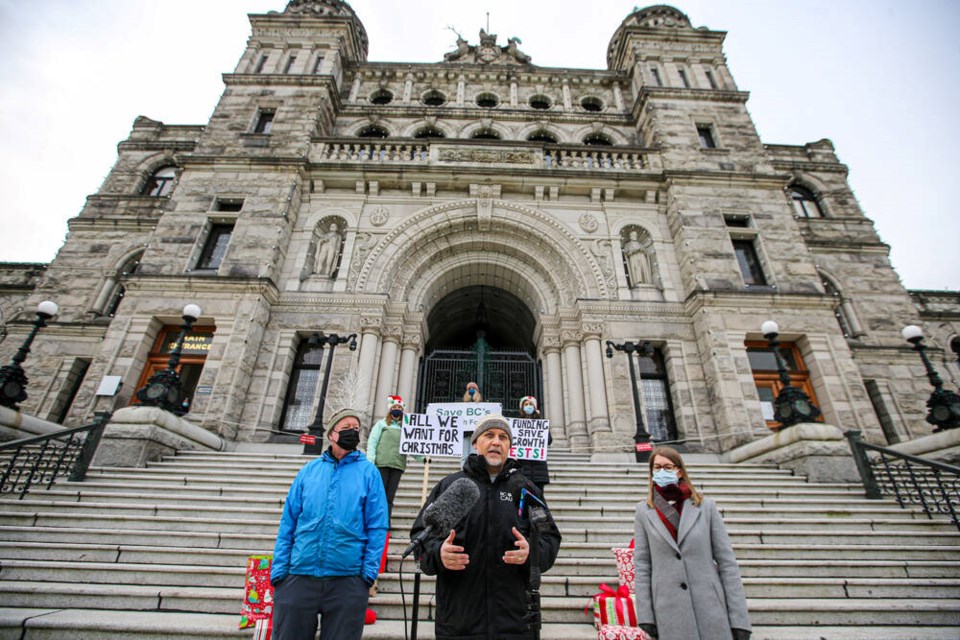Environmentalists gathered at the B.C. legislature Tuesday to call on the provincial government to provide funding to forestry-reliant First Nations considering old-growth-logging deferrals in their territory.
In early November, the province said it planned to work with First Nations to defer logging of ancient, rare and large trees within 2.6 million hectares of B.C.’s most at-risk old-growth forests. The province asked First Nations for a response to the proposed temporary measures within 30 days. Nearly three-quarters of the 161 nations responded to say they need more time to review technical information or to incorporate local Indigenous knowledge into the proposed deferral plans before making a decision.
The province’s promise last month to halt logging in those areas is “virtually meaningless” without adequate funding to the communities considering turning away from the economic benefits of harvesting old-growth trees, said Andrea Inness, a campaigner for the Ancient Forest Alliance.
“They need to commit significant funding to the tune of hundreds of millions of dollars in budget 2022 to support First Nations to protect old-growth forests and develop alternatives to old-growth logging,” Inness said Tuesday at an event on the front steps of the legislature.
Inness was joined by Adam Olsen, B.C. Green MLA for Saanich North and the Islands and a member of the Tsartlip First Nation, and Andy MacKinnon, a forest ecologist and Metchosin councillor.
Olsen said the province’s $12.7 million in funding over three years amounts to about $80,000 per nation to conduct technical analysis of forests on their territory. “There’s not enough revenue on the table to do that really important, critical, technical work that needs to be done, so it’s no surprise that Indigenous nations need more time to do that work,” Olsen said.
MacKinnon, whose research has focused on the differences between old-growth and second-growth forests, said many animal and plant species, such as bears, salamanders, fungi and lichens, depend on old-growth forests for habitat.
“For a number of these species, we just don’t find them in second-growth forests, and that’s because their habitat has been removed,” he said.
At the current pace of logging, MacKinnon expects unprotected old-growth forests on southern Vancouver Island will be gone in just a few years.
The province is working with First Nations that want to move forward on immediate deferrals and continues to engage with others that want more time and reach out to nations that have not responded, the Ministry of Forests, Lands and Natural Resource Operations said in an emailed statement.
A separate group calling itself Save Old Growth says it will begin a campaign of “continuous disruption” of the Trans- Canada Highway around Victoria and Vancouver starting Jan. 10 if the government doesn’t end all old-growth logging.
People participating in the movement will sit down on the road to force the government to act, said Brent Eichler, an organizer for the campaign.
“We’re expanding the fight in the forest to the city streets, and that means we’re going to be disrupting business as usual,” he said.
Eichler said the civil disobedience is modelled after a movement called Insulate Britain, which has seen groups block major roads in and around London to push for a national program to ensure homes are insulated to reduce energy use by 2030.



